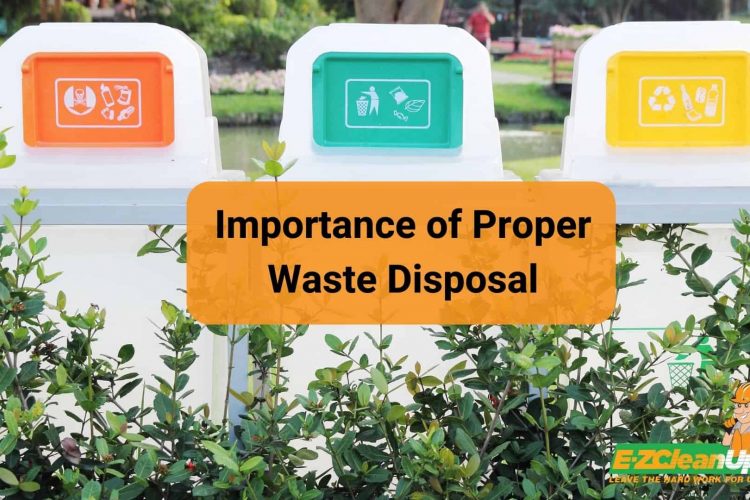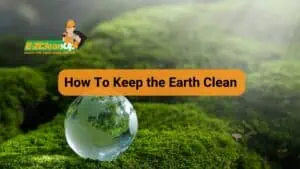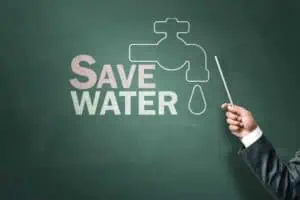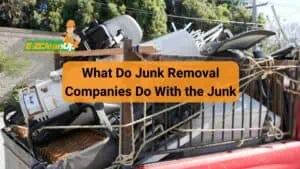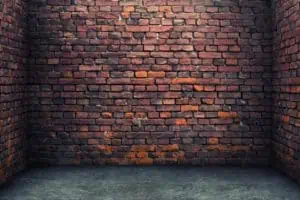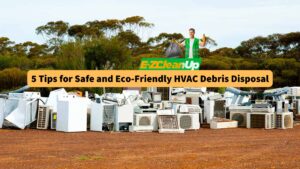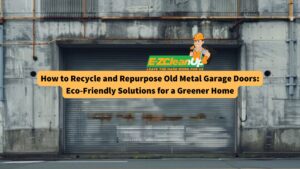Proper waste disposal prevents 80 to 90% of waste from going to landfills, reduces waterborne disease risks, and significantly curbs environmental pollution. These benefits underscore its crucial role in a healthy and sustainable environment.
Ready to understand the importance of proper waste disposal? Keep reading.
Why Is Proper Waste Disposal Important?
Every day, households, industries, and offices produce large amounts of waste. The manner in which we handle and dispose of this waste significantly impacts our environment and quality of life.
Here’s a look at the reasons why proper waste disposal is important:
🌍 Sustain Health Standards
Waste, especially organic waste, is a breeding ground for harmful bacteria and pests. If not disposed of properly, it can lead to the spread of diseases like cholera, typhoid, and malaria. By knowing the importance of proper waste disposal and ensuring you get it done, we prevent these pathogens from entering our homes and our bodies.
Inappropriate disposal of waste, like burning, can release harmful chemicals into the air. These chemicals can cause respiratory issues and other health problems for humans and animals alike. Proper waste disposal ensures cleaner air and a healthier living environment.
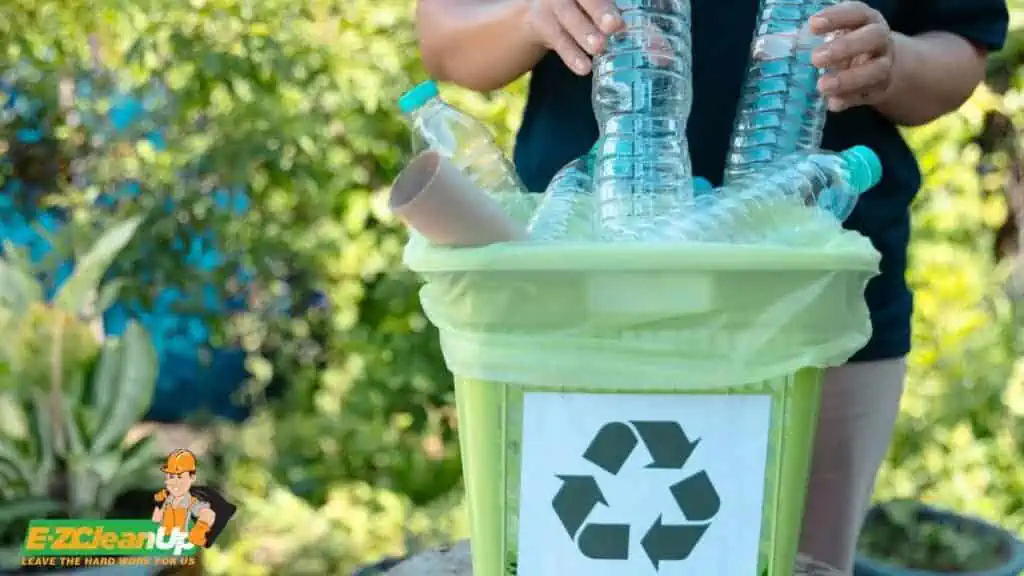
🌱 Support a Sustainable Lifestyle
- Reduces Landfill Space: Proper disposal techniques like recycling and composting reduce the amount of trash sent to landfills and help conserve land.
- Protects Ecosystems: Dumping waste in oceans or forests disrupts the balance of ecosystems. Animals may consume harmful waste, which can lead to sickness or even death.
♻️ Promotes Recycling
Instead of throwing everything into a single bin, recycling ensures that materials like paper, glass, and plastic are processed and remade into new products. Creating products from recycled materials often uses less energy than producing them from new raw materials. Additionally, incorporating plant-based plastic, which is derived from renewable resources, into recycling streams can further reduce environmental impact. These biodegradable alternatives decompose faster than traditional plastics, lowering landfill waste and supporting a healthier planet.
🌊 Maintain Environmental Cleanliness
- Reduced Land and Water Pollution: When waste is dumped recklessly, harmful chemicals can leach into the ground, which can contaminate land and underground water sources.
- Prevention of Littering: By ensuring waste finds its rightful place, we prevent streets, parks, and other public places from being littered with trash.
- Cleaner Air: Proper disposal of waste prevents people from burning waste recklessly, which can release harmful pollutants into the air.
Consequences of Improper Waste Disposal
While managing waste responsibly has many benefits, it’s equally crucial to understand the repercussions of neglecting this duty.
Pollution of Air, Water, and Soil
The negative effects of dumping waste carelessly can be felt across various elements of our environment.
- When waste is burned openly, especially plastics and electronics, harmful toxins are released into the atmosphere.
- Discarding waste in inappropriate places, such as water bodies or near them, can contaminate both surface and groundwater.
- Dumping waste, especially chemicals and non-biodegradable materials, can poison the soil.
Impact on Wildlife and Ecosystems
Our environment is a delicate balance of ecosystems, each housing various forms of life. Improper waste disposal can severely disrupt this balance.
Ingestion and Entanglement
Waste materials, especially plastic, often end up in our oceans and forests. Marine animals, mistaking these for food, can ingest them, and this can lead to fatal blockages or poisoning. Similarly, animals can become entangled in discarded items, which block their movement or cause direct harm.
Habitat Destruction
Dumping waste, especially in natural habitats, can destroy homes and breeding grounds for many animals. These actions can force species to migrate, sometimes leading them into hostile environments or bringing them into conflict with humans.
Introduction of Foreign Species
Waste from one region can introduce non-native species to another when it’s moved or dumped recklessly. These new species can become invasive, threaten local wildlife, and upset the balance of the ecosystem.
Health Hazards
Improper disposal of waste has direct implications for human health. Waste, particularly organic waste left unattended, becomes a breeding ground for pests such as rats and mosquitoes. These pests can be causes of diseases like dengue, malaria, and leptospirosis.
Hazardous waste, when not appropriately treated or disposed of, can leak chemicals into the soil and water. People consuming contaminated water or crops can be exposed to these chemicals, which can lead to a range of health issues, from skin conditions to more severe ailments.
Economic Costs
Mismanagement of waste not only damages the environment and health but also puts a strain on the economy.
- Cleanup Efforts: Areas heavily polluted due to improper waste disposal require significant resources to clean up. These efforts are costly and often funded by taxpayer money.
- Healthcare Costs: The health issues arising from improper waste management lead to increased hospital visits, treatments, and medications. This increases the overall healthcare costs for individuals and the state.
- Loss of Tourism: Places known for their natural beauty can lose their appeal due to littering and pollution. Tourism is a primary source of income for many regions, and its decline can severely impact the local economy.
- Reduced Property Value: Areas near overflowing landfills or heavily polluted regions can experience a drop in property values. As a result, homes and businesses in these areas can lose a significant portion of their worth.
Types of Waste
The variety in the nature and source of waste means that each type has its own set of challenges and solutions. Understanding these distinct categories is the first step in addressing the broader issues of waste management and ensuring that our strategies are tailored to meet the specific needs of each type.
Municipal Waste
Often referred to as household waste, this includes everyday items we dispose of, such as food scraps, paper, glass, and plastics. It’s what typically ends up in our trash bins. Recycling and composting can significantly reduce the volume of waste reaching landfills.
Hazardous Waste
These are wastes that can be dangerous or potentially harmful to our health or the environment. Examples include paints, pesticides, chemicals, and certain cleaning agents. Proper storage, treatment, and disposal ensure these materials don’t pose a risk to the environment or population.
Electronic Waste (E-waste)
This refers to discarded electronic devices and components. E-waste can contain harmful elements like mercury, lead, and cadmium. Recycling components and ensuring responsible disposal can prevent harmful elements from entering the environment.
Biomedical Waste
Originating from medical sources, this includes syringes, bandages, body parts, and chemical byproducts from medical procedures. Mishandling can lead to the spread of diseases. Incineration, autoclaving, and chemical treatments are methods to ensure safe disposal.
Industrial Waste
This is the waste produced by industrial activities like manufacturing, power generation, and mining. This can include byproducts like sludge, ash, or heavy metals. Depending on the industry, these wastes can vary in toxicity. Treatment plants and recycling processes can help mitigate the adverse effects of industrial waste.
Agricultural Waste
This comprises waste resulting from farming activities. It includes materials like crop residues, manure, and discarded pesticides. Through composting and responsible use of pesticides and fertilizers, the impact of agricultural waste can be minimized.
Practical Tips for Responsible Waste Disposal
Here are some things you can do to dispose of your waste responsibly:
Segregation and Recycling
Use separate bins for biodegradable, recyclable, and non-biodegradable waste at home. Know what can and cannot be recycled in your locality. For items like electronics, consider using designated drop-off points or recycling events where these can be processed responsibly.
Proper Disposal Methods for Hazardous Waste
Store hazardous waste like paints, batteries, and chemicals in their original containers to prevent leaks and mix-ups. Many municipalities offer collection days for hazardous household waste. Utilize these services to ensure that they are treated and disposed of correctly. Never pour hazardous liquids down the drain. They can contaminate water sources and harm aquatic life.
Reducing Waste Generation through Sustainable Practices
- Opt for reusable containers, bags, and cutlery.
- Turn kitchen scraps and yard waste into nutrient-rich compost.
- Purchase products with minimal packaging or opt for those in biodegradable or recyclable packaging.
Encouraging Community Involvement and Awareness
- Organize Clean-Up Drives: Bringing the community together for neighborhood or beach clean-up drives can have a dual benefit – a cleaner environment and heightened awareness.
- Educate and Advocate: Host or attend workshops that focus on waste management.
- Support Green Businesses. Support businesses that follow sustainable practices.
Seal the Deal on Proper Waste Disposal
From maintaining our health and ecological balance to safeguarding the planet’s future, responsible waste management is crucial to sustainable living. But while understanding its significance is important, taking action is the real game-changer. Fortunately, services like what we’re offering at EZ CleanUp exist to bridge the gap between awareness and action.
We’re a junk removal company in Philadelphia that offers comprehensive junk removal solutions. We ensure that waste, whether from homes or construction sites, is handled with care and professionalism. Our expertise ranges from cleaning out cluttered spaces to handling heavy construction materials, making waste management efficient and hassle-free.
So, whether you’re a homeowner looking to declutter, a business in need of junk removal, or a contractor aiming for a clean construction site, call EZ CleanUp today. Let’s work together towards a cleaner, healthier, and more sustainable tomorrow. Because when it comes to proper waste disposal, every effort counts.

